The Dictatorship
Some of Trump’s most loyal voters are now feeling the sting of his betrayal
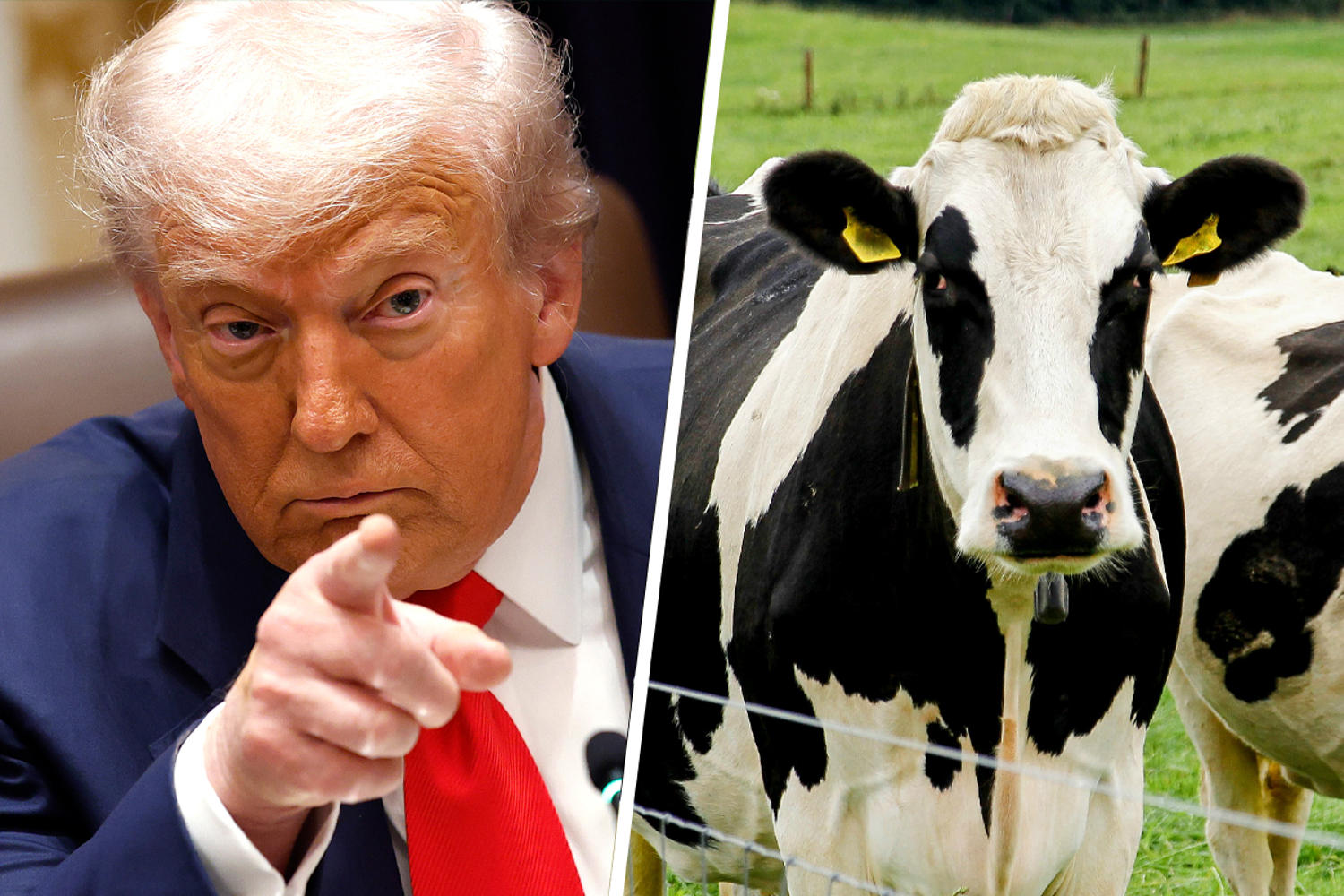
Cattle producers are shocked — betrayed, even. How could Donald Trump sell them out just as they’re finally making good profits on their beef? Doesn’t he love farmers and ranchers and everyone in rural America? In recent days, the president has made clear the answer — his feelings toward ranchers aren’t “love.”
Last week, the president floated the idea of buying more beef from Argentina, and within days the administration released a plan to quadruple Argentinian beef imports. The goal, Trump said, was to “bring our beef prices down,” but the plan neatly dovetails with Trump and Treasury Secretary Scott Bessent’s efforts to boost the political fortunes of Trump ally Javier Milei, the president of Argentina, an effort that includes $40 billion in financial assistance to bail out Argentina’s financial markets.
Everyone who buys beef has noticed how dramatically prices have risen in the last few years.
Not surprisingly, America’s cattle ranchers didn’t react too well; some recorded videos from their ranches, saying that even though they love Trump, this plan will hurt them at a critical moment for their industry. Even some Republicans from farm states, so wary of crossing the president on anything, have raised objections.
We all know how well Trump reacts to being told he’s wrong. In response to the criticism, he scolded them on Truth Social, posting, “The Cattle Ranchers, who I love, don’t understand that the only reason they are doing so well, for the first time in decades, is because I put Tariffs on cattle coming into the United States, including a 50% Tariff on Brazil. If it weren’t for me, they would be doing just as they’ve done for the past 20 years — Terrible! It would be nice if they would understand that, but they also have to get their prices down, because the consumer is a very big factor in my thinking, also!”
The ranchers are like Lando Calrissian in “The Empire Strikes Back,” protesting that he had a deal with Darth Vader. “I am altering the deal,” Vader responds. “Pray I do not alter it any further.” At that point, Lando knows he’s been played. It’s unclear if the ranchers have been clued in.
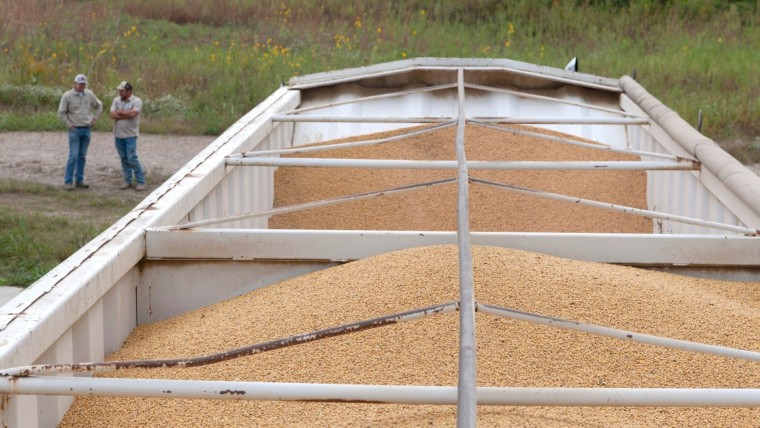
Everyone who buys beef has noticed how dramatically prices have risen in the last few years. Just since Trump took office in January, the price of ground chuck is up by 20%. The reasons why are not complicated: It’s a simple matter of supply and demand. After years of drought, the size of the national cattle herd fell. Then, as Trump admits in the Truth Social post, “because I put Tariffs on cattle coming into the United States,” foreign imports fell. Imports from Mexico were also suspended entirely earlier this year after an infestation of screwworm.
Yet Americans keep buying more beef. Higher demand plus lower supply equals higher prices. That’s great for cattle ranchers, who say they’re finally making good profits after several lean years. But it’s not so great for consumers.
The ranchers ought to ask themselves why they ever thought Trump cared about them in the first place.
If the price of beef were all that’s going up, it wouldn’t be such a political problem. But inflation data released on Friday showed the annual rate of inflation increasing to 3%. Electricity bills are rising. Millions of Americans are about to see dramatic spikes in their health insurance premiums, both those who buy their insurance on the Affordable Care Act exchanges and those with employer-provided insurance. More car owners are struggling to make their payments. Consumer sentiment is positively dreadful.
You can bet Trump knows this, especially because during the 2024 campaign he repeatedly promised that as soon as he was elected, prices would plummet (“When I win, I will immediately bring prices down, starting on Day 1”). Within the last month, as BLN’s Steve Benen noted Friday, Trump has claimed to have “successfully ‘defeated,’ ‘cured’ and ‘solved’ inflation.” He probably also knows that Americans give him lower ratings on handling the cost of living than on any other issue. If you want to know how quickly inflation can torpedo a presidency, just ask Joe Biden.
To be fair to Trump, there’s no way he can simultaneously satisfy the ranchers, who want beef prices to stay high, and the rest of us, who want to spend as little as possible at the grocery store. But the ranchers ought to ask themselves why they ever thought Trump cared about them in the first place.

It’s the same issue that farmers are now confronting, after Trump’s ruinous trade war has — just as anyone who knows anything about agricultural trade predicted — devastated the soybean industry. Now farmers are left waiting for a bailout.
Given all that, one would think there’s an opening for Democrats to make a case to ranchers, farmers and everyone else in rural America. If Democrats had the guts (which they probably don’t), they could start by telling those rural folk an uncomfortable truth: You thought Trump loved you, and you gave him your votes. But you got nothing in return, as surely as any enrollee in Trump University. He was always going to sell you out the moment it was in his interest, and that’s just what’s happening now.
The question isn’t how many farmers and ranchers will vote for Democrats, because they’re a tiny portion of the population. According to government datafewer than a million and a half Americans farm as their primary occupation, or less than one-half of 1% of the population. But rural America writ large is central to Trump’s coalition, and Democrats tiptoe around those voters, desperate to show they’re listening and they care. They’d get a lot farther if they began their argument by saying “the Republicans you’ve been voting for up and down the ballot, starting with Trump? They take your votes for granted and make your lives worse in return.”
Last week, Trump posted an AI-generated video on social media portraying himself dumping excrement on Americans who live in cities. He didn’t post another one showing him doing the same to ranchers and farmers, but he might as well have, for all he actually cares about them. And his opponents shouldn’t be shy about reminding rural Americans exactly what Trump thinks of them.
The Dictatorship
‘Deeply disturbing portrait of America’: Nicolle Wallace rips GOP over looming SNAP cutoff
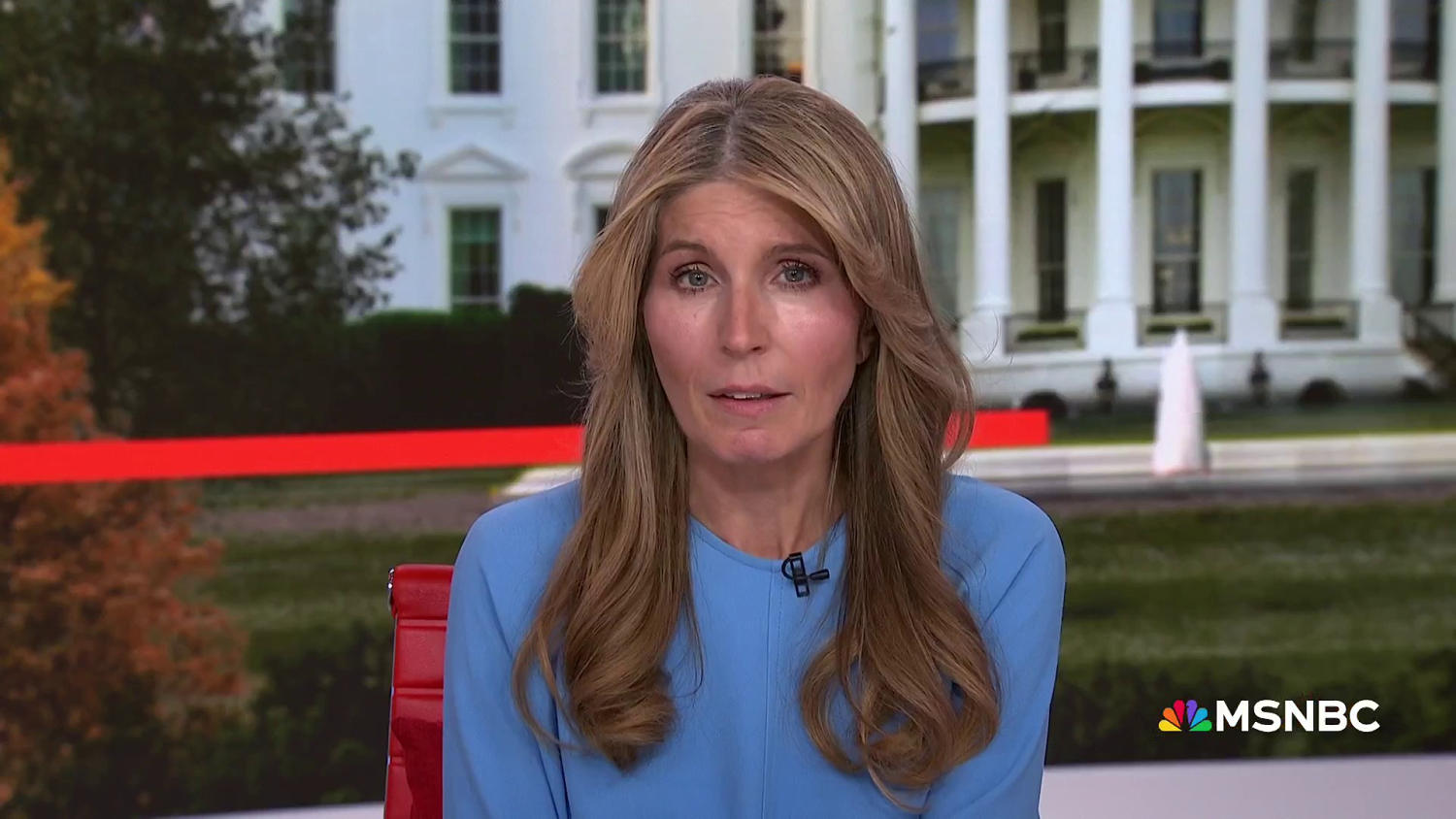
Come Saturday, the 42 million Americans who depend on the Supplemental Nutrition Assistance Program, or SNAP, will be forced to go without benefits due to the ongoing government shutdown.
On Monday’s “Deadline: White House,” Nicolle Wallace placed the blame for the looming lapse entirely on the president and the Republican Party. “It is awful when anyone in America goes hungry, and it is a choice,” she said, “it’s Donald Trump’s choice.”
The BLN host noted this isn’t the first time the administration has slashed food assistance for some of America’s most vulnerable. In March, it cut approximately $500 million in aid for food banks.
“That $300 million that Donald Trump is spending on making a gold ballroom where the East Wing once stood, and the $230 million he’s trying to get us, the American taxpayers, to reimburse him for being under criminal investigation, they add up to roughly the same amount of money he has cut from America’s food banks,” Wallace said.
The BLN host called the split-screen of Trump’s White House renovations and the impending cuts “a deeply disturbing portrait of America,” adding, “the images of Donald Trump destroying —with an actual wrecking ball — the actual East Wing of the White House, while Americans are about to go without food stamps, is a snapshot of America that will live forever.”
Wallace also called out the president for pushing “policies that will hurt the parts of the coalition he used to publicly speak out for.”
“Food insecurity in America is a lot more common than anybody can imagine, and it knows no party affiliation,” she explained. “It does not care who you voted for, and the fact that Trump and all the Republicans in Congress are opting into this tragedy, this sort of shameful thing in America in 2025, should be front-page news all over the place.”
You can watch Wallace’s full analysis in the clip at the top of the page.
The Dictatorship
Lawmakers see the pain of the shutdown — and are digging in even harder
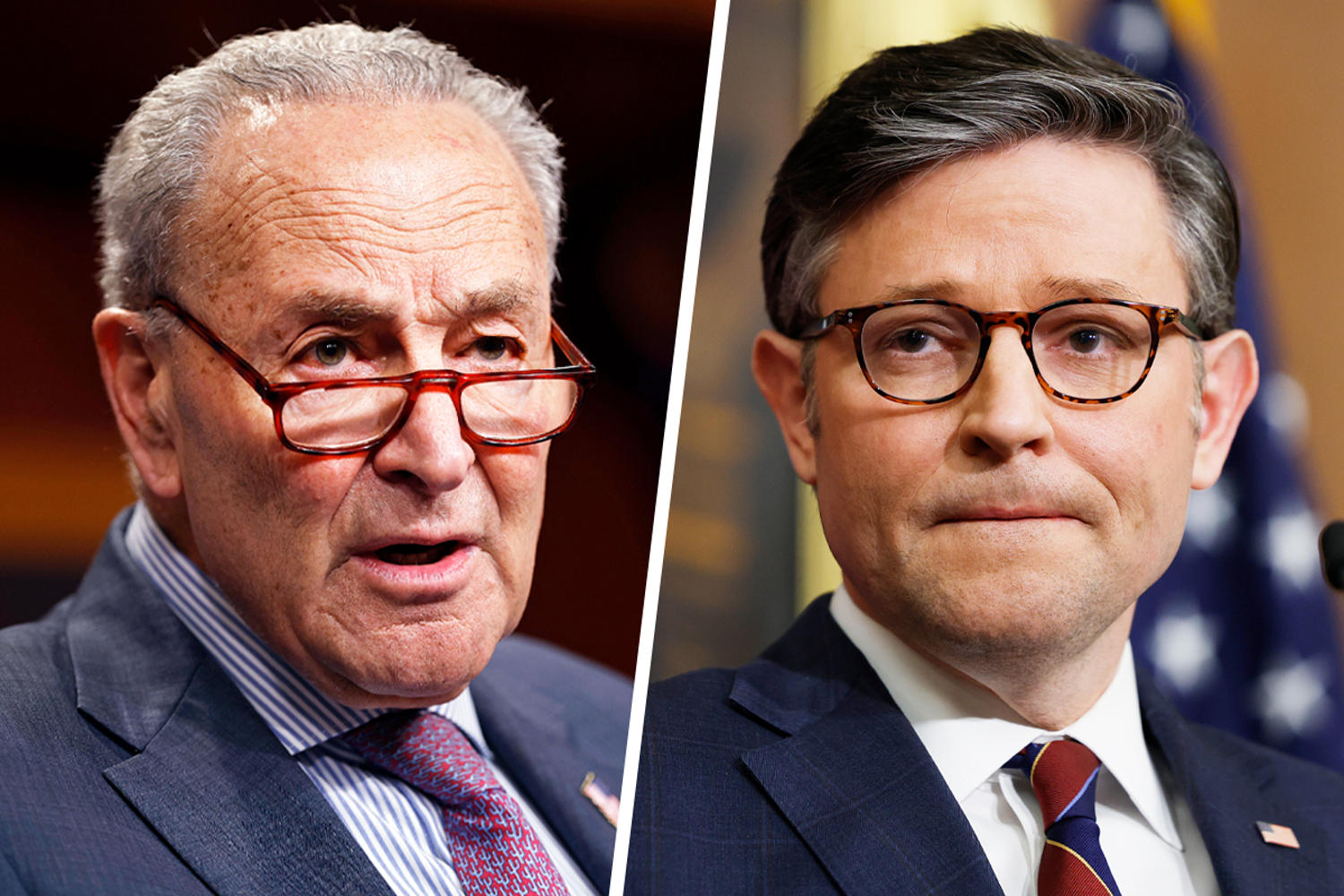
As the government shutdown reaches the monthlong milestone, both parties agree on two things: The pain is mounting, and that the other party should give in.
Republicans and Democrats widely acknowledge how the shutdown is hurting Americans. They see food benefits running outmore missed paychecks on the horizon and the prospect of low-income pregnant women, infants and children in the WIC assistance program not receiving aid.
But, thus far, the general reaction from lawmakers in both parties has been to argue that this latest pain point is just evidence that the other side needs to succumb to the demands of their party.
Republicans say the quickest way to address the escalating pain is to pass the GOP’s short-term spending bill that the House approved last month, which most Senate Democrats have shot down 13 times.
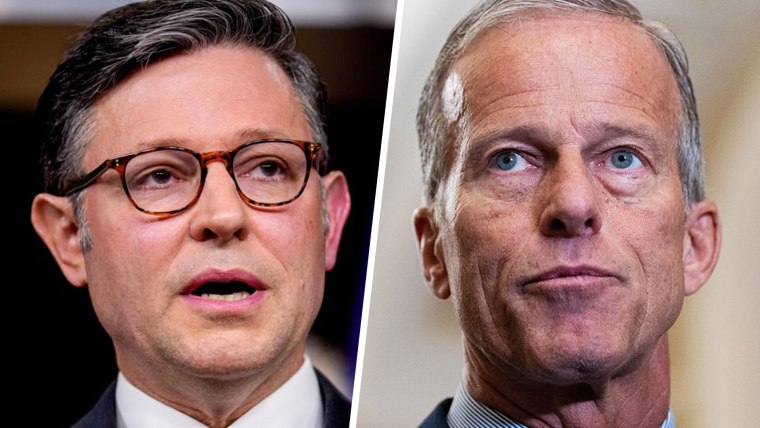
Ask a GOP lawmaker about, say, the approaching cliff for the Supplemental Nutrition Assistance Program, and they’ll agree it’s a major problem.
“It’s a serious issue, that’s 40 million Americans,” Sen. James Lankford, R-Okla., said. “It affects a lot of people, and my desire is to have this settled a month ago.”
But ask Lankford whether that SNAP cliff is affecting his thinking, and he’ll suggest “the only way” to fix the problem is for Democrats to support the Republican-continuing resolution.
“It’s the only vehicle that’s ready right now,” Lankford said.
Democrats say that proposal is a nonstarter — not because they disagree with anything in the bill, but because they want a fix to expiring Obamacare tax credits included in the legislation. Not extending those subsidies, Democrats warn, will cause health-care premiums to skyrocket for millions of Americans.
Every day that they get closer to the next pain point is to their disadvantage, and frankly, I think it exposes them to the wrath of what they consider to be their own base.”
Sen. Kevin Cramer, R-N.D.
But ask a Republican such as Sen. Kevin Cramer, R-N.D., whether open enrollment starting on Nov. 1 is an incentive for Republicans to start negotiating with Democrats, and he’ll tell you that it’s actually “a lot of incentive for Democrats to finally come to their senses and reopen the government so we can have that discussion.”
“Every day that they get closer to the next pain point is to their disadvantage, and frankly, I think it exposes them to the wrath of what they consider to be their own base,” Cramer said.
Democrats, of course, see it the other way. Senate Minority Leader Chuck Schumer, D-N.Y., said Tuesday afternoon he believes there will be “increased pressure” on Republicans to negotiate with Democrats once open enrollment begins.
But so far, that hasn’t happened — and the belief that President Donald Trump will come to the table once he sees the scope of the rising premiums may not bear out.
Democrats do, however, agree that the SNAP cliff is a big problem. From their perspective, that’s just all the more reason Republicans should work out a broader deal, with some Democrats taking offense to the suggestion that Republicans suddenly care more about food benefits than their party.
“This is the same party that cut billions of dollars from SNAP benefits in order to fund tax cuts for the ultra-wealthy,” Sen. Ruben Gallego, D-Ariz., told BLN, referring to the GOP reconciliation bill over the summer. “Now they are suddenly the protectors of people on SNAP benefits? It’s all BS.”
Gallego noted that, even if Congress approves funding, GOP lawmakers could claw the dollars back through rescissions — something Republicans have already done this year.
“I don’t trust them,” Gallego said.
Sen. Jeanne Shaheen, D-N.H., a moderate Democrat who broke with the majority of her party in March to support a GOP funding bill, agreed that Congress has to address SNAP running out of money. But she suggested that it shouldn’t come in lieu of Congress addressing the expiring Obamacare tax credits.
“We gotta be able to provide the SNAP benefits that people are entitled to, and the premium tax credits that will make health insurance affordable, and keep the government open,” Shaheen said.

The hardening of positions comes as the shutdown is on the brink of its fifth week, inching closer to breaking the current record for the longest shutdown in history: the 35-day lapse in funding of 2018-19.
During previous shutdowns, mounting pain was a key part of solving the impasses. The 2013 shutdown ended, in large part, because the U.S. was about to reach the debt limitand a major reason the 2018-19 shutdown ended was because air traffic controllers stayed home and grounded flights. But this time around, lawmakers are looking at the pain and suggesting it’s a key reason why the other side should relent.
There is hardly any inward reflection — and neither side is seeing much political blowback, with Americans narrowly blaming Republicans more than Democrats for the shutdown in polls.
“I believe both sides think they’re either winning or they’re not losing, and that’s not fertile ground for any change,” said Sen. Thom Tillis, R-N.C. “For another week or two.”
For a potentially record-breaking shutdown, the standoff has been marked by how little Republicans and Democrats are talking. The GOP position, in fact, is that they have nothing to discuss. Republicans say they will only talk about those expiring subsidies once the government is reopened. Democrats say that will leave Americans making health-care decisions with incomplete information.
Democrats think Americans should know what they’ll be paying for Obamacare before they’re forced to make those decisions during open enrollment, and they refuse to accept on blind faith that Republicans will extend subsidies in some form.
With those positions established — for Republicans, that there is nothing to discuss, and for Democrats, that the GOP has to come to the table — there’s been very little movement over the past month.
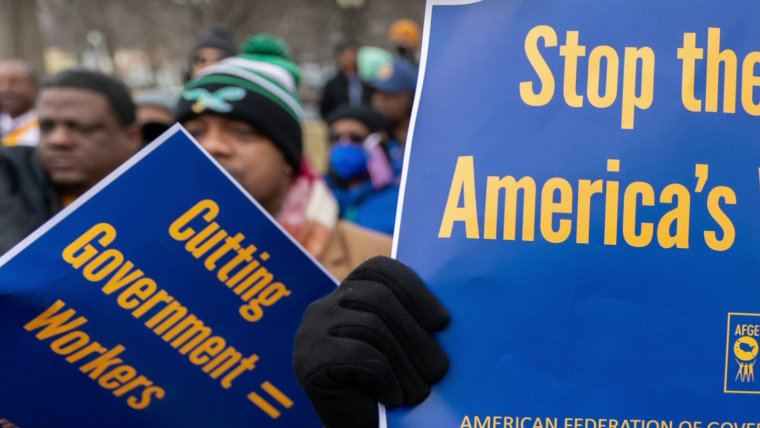
Even a statement from the American Federation of Government Employees, the largest union representing federal workers that has traditionally supported Democrats, did little to change the dynamic this week — even as AFGE called on Democrats to pass the Republican spending bill and stop “punishing the people who keep our nation running.”
Most Democrats were simply incredulous about the statement.
Sen. Tim Kaine, D-Va., noted that he works very closely with that union. “The AFGE would not want us to cut a deal and then have Trump fire a bunch of people next week,” Kaine said. “If we cut a deal and then he did that, they would come to us and say, ‘What the hell were you guys thinking?’”
When reporters asked Sen. Gary Peters, D-Mich., about the AFGE statement on Monday, he reiterated the general Democratic position: “I don’t like shutdowns.”
“I think we should never have a shutdown,” Peters said. “That’s why I hope Republicans would come with us and find common ground.”
When known asked Peters whether he agreed with AFGE’s position that the GOP funding bill should pass, he made it clear that Democrats still wanted a resolution on the Obamacare subsidies. “So I’m going to do that,” he said.
And then he succinctly summed up how lawmakers — and outside groups — seem to be talking past one another.
“I agree, we don’t want a shutdown,” Peters said. “We want to end the shutdown as quickly as possible, I totally agree with that.”
She covers Capitol Hill involving both Democrats and Republicans. She previously covered Congress at Blue Light News. She graduated from George Washington University’s School of Media and Public Affairs with a bachelor’s degree in journalism and mass communication and political science. She is a native New Yorker, Billy Joel’s No. 1fan and a Rubik’s Cube aficionado.
The Dictatorship
Trump appeals hush money conviction, citing Supreme Court immunity case and other issues
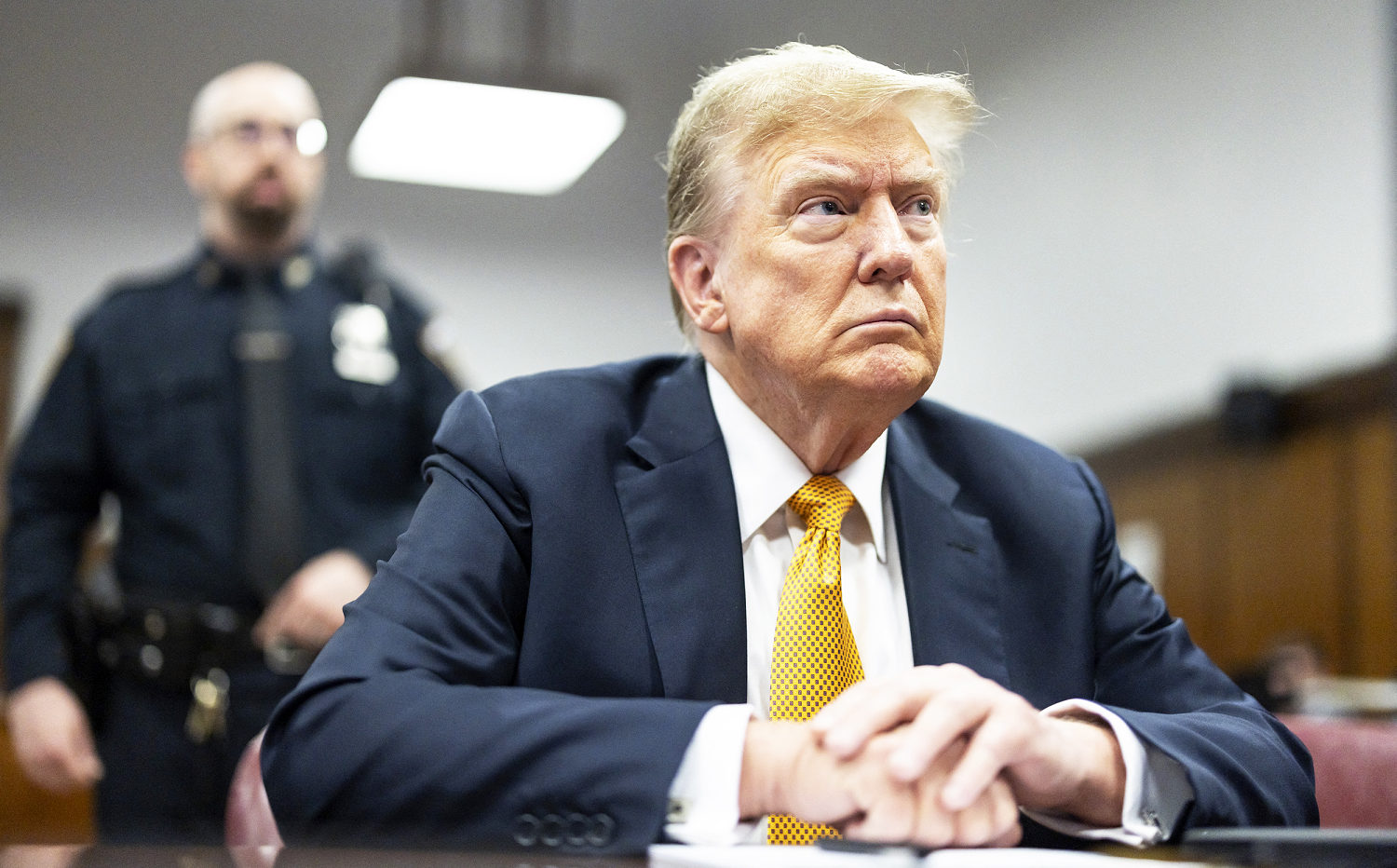
While his administration prosecutes his political opponentsPresident Donald Trump is appealing his criminal conviction in a case that he calls “the most politically charged prosecution in our Nation’s history.”
Seeking to upend his loss in the so-called hush money case, Trump’s lawyers lean on the Supreme Court’s immunity ruling from another one of his criminal cases to argue that New York state prosecutors wrongly used evidence of his official presidential acts to convict him. The jury found him guilty last year of falsifying business records to cover up a hush money scheme in connection with the 2016 presidential race.
Citing the immunity ruling’s provision against using evidence of official acts to secure convictions for unofficial conduct, his lawyers point to evidence at trial from his first term in office: discussions with White House communications director Hope Hicksstatements on social media, discussion with the attorney general and testimony about White House operations.
In previous litigation at the trial level, Manhattan District Attorney Alvin Bragg’s office argued that the immunity case “has no bearing on this prosecution” and that it wouldn’t support vacating the jury verdict “even if its reasoning did apply here.”
Trump’s brief was filed Monday to New York’s intermediate appeals court (the same court that recently gave him a partial win in his civil fraud appeal). After that court rules (it’s unclear when it will), the state’s top court could also weigh in. So could the U.S. Supreme Court, which hasn’t yet defined the outer limits of the immunity that it laid out in last year’s ruling for Trump in the federal election interference case. The president is separately trying to move the hush money appeal to proceed in federal court. Whichever path it takes, the final word on the case might not come for a while.
Trump was sentenced in January to an unconditional dischargewhich was basically a non-punishment to allow the case to wrap up before he re-entered the White House. A divided Supreme Court declined to halt his sentencing, over the dissent of four Republican-appointed justices: Clarence Thomas, Samuel Alito, Neil Gorsuch and Brett Kavanaugh.
Part of the rationale in the high court majority’s brief, unsigned order allowing the sentencing to proceed was that “the alleged evidentiary violations at President-Elect Trump’s state-court trial can be addressed in the ordinary course on appeal.” It’s that “ordinary course” that is now playing out.
The immunity issue is just one of the claims that Trump’s lawyers raise in the appeal. They also argue that the state prosecution was preempted by federal law, that the jury was wrongly instructed, that the evidence was insufficient, and that the presiding judge, Juan Merchan, should’ve recused himself.
The hush money case is the only one of Trump’s four criminal cases that went to trial. In his two federal cases — the classified documents case and the election interference case that produced the immunity ruling — the DOJ dropped them after he won the 2024 election, citing the department’s policy against prosecuting sitting presidents. The fate of the fourth case, a state election interference case brought in Georgia, is technically in limbo (though likely dead, in reality) after Fulton County District Attorney Fani Willis was disqualified from prosecuting it. The president pleaded not guilty in all four cases.
Subscribe to the Deadline: Legal Newsletter for expert analysis on the top legal stories of the week, including updates from the Supreme Court and developments in the Trump administration’s legal cases.
Jordan Rubin is the Deadline: Legal Blog writer. He was a prosecutor for the New York County District Attorney’s Office in Manhattan and is the author of “Bizarro,” a book about the secret war on synthetic drugs. Before he joined BLN, he was a legal reporter for Bloomberg Law.
-
Uncategorized12 months ago
Bob Good to step down as Freedom Caucus chair this week
-

 Politics8 months ago
Politics8 months agoFormer ‘Squad’ members launching ‘Bowman and Bush’ YouTube show
-

 The Josh Fourrier Show12 months ago
The Josh Fourrier Show12 months agoDOOMSDAY: Trump won, now what?
-

 The Dictatorship8 months ago
The Dictatorship8 months agoPete Hegseth’s tenure at the Pentagon goes from bad to worse
-

 Politics8 months ago
Politics8 months agoBlue Light News’s Editorial Director Ryan Hutchins speaks at Blue Light News’s 2025 Governors Summit
-

 The Dictatorship8 months ago
The Dictatorship8 months agoLuigi Mangione acknowledges public support in first official statement since arrest
-

 Politics8 months ago
Politics8 months agoFormer Kentucky AG Daniel Cameron launches Senate bid
-

 Politics12 months ago
Politics12 months agoWhat 7 political experts will be watching at Tuesday’s debate











